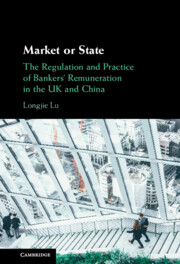Book contents
- Market or State
- Market or State
- Copyright page
- Dedication
- Contents
- Figures
- Tables
- Preface
- Abbreviations
- 1 Introduction
- 2 The Pre-GFC Practice of Bankers’ Remuneration in the UK
- 3 The Regulation of Bankers’ Remuneration in the UK
- 4 The Post-GFC Practice of Bankers’ Remuneration in the UK
- 5 The Traditional Practice of Bankers’ Remuneration and Incentives in China
- 6 The Regulation of Bankers’ Remuneration in China
- 7 The Recent Practice of Bankers’ Remuneration and Incentives in China
- 8 Market or State: Differences in the Regulations and Practices of Bankers’ Remuneration in the UK and China
- 9 Conclusion
- Book part
- Bibliography
- Index
4 - The Post-GFC Practice of Bankers’ Remuneration in the UK
Published online by Cambridge University Press: 15 September 2022
- Market or State
- Market or State
- Copyright page
- Dedication
- Contents
- Figures
- Tables
- Preface
- Abbreviations
- 1 Introduction
- 2 The Pre-GFC Practice of Bankers’ Remuneration in the UK
- 3 The Regulation of Bankers’ Remuneration in the UK
- 4 The Post-GFC Practice of Bankers’ Remuneration in the UK
- 5 The Traditional Practice of Bankers’ Remuneration and Incentives in China
- 6 The Regulation of Bankers’ Remuneration in China
- 7 The Recent Practice of Bankers’ Remuneration and Incentives in China
- 8 Market or State: Differences in the Regulations and Practices of Bankers’ Remuneration in the UK and China
- 9 Conclusion
- Book part
- Bibliography
- Index
Summary
This chapter investigates the practice of bankers’ remuneration in the UK after the GFC and analyses the effectiveness of the regulatory initiatives. To track the changes, the investigation is also based on the UK ‘Big Four’ banks. It is found that the focus of performance-based remuneration has shifted from short-term incentives to long-term incentives. Complying with deferral, clawback and malus, the period of performance assessment has been significantly extended. Banks have also adopted risk-adjusted and stability-oriented indicators to link bankers’ remuneration to the sustainability and risk management of banks. However, to circumvent bankers’ bonus cap, banks have introduced role-based pay – a new form of fixed remuneration. Role-based pay is counterproductive, as it may reduce pay-performance sensitivity while encouraging bankers to take excessive risks. This chapter also argues that bankers’ bonus cap is conflicted with other initiatives, the implementation of which relies on performance-based remuneration constituting a significant portion of the total remuneration.
Keywords
- Type
- Chapter
- Information
- Market or StateThe Regulation and Practice of Bankers' Remuneration in the UK and China, pp. 64 - 88Publisher: Cambridge University PressPrint publication year: 2022

